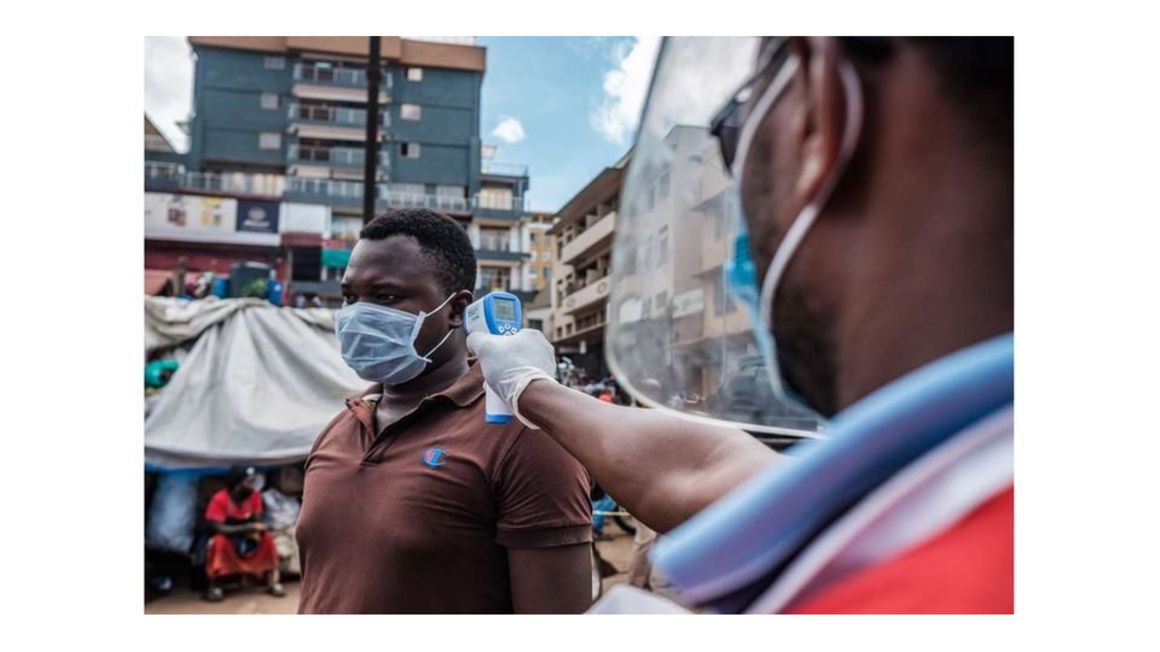
A Red Cross volunteer checks a man's temperature before he is allowed to enter Nakasero market in Kampala, Uganda
The Ugandan government on Friday partially relaxed the Covid-19 restrictions it imposed on June 18, citing a “consistent reduction” in the rate of infection.
President Yoweri Museveni told the country on Friday night there had been a positive outcome from the tight restrictions that included a ban on inter-district travel across the country.
It means that public market centres, malls and arcades will be allowed to reopen as long as they follow a strict guideline on hygiene, decongestion and registration of staff, especially at malls. Markets will only be allowed to sell on wholesale.
Bodabodas who had been totally banned from the roads will now be allowed to transport cargo or a passenger at a time, with both riders and passengers needed to wear masks at all times.
However, Uganda will not reopen schools until the country gets a requisite percentage of people on full vaccination. Instead, government officials were directed to provide learning material for online studies.
When he locked down the country on June 18, Uganda was reporting an average of 1000 new cases day and the measures were imposed after more than 30 people died for lack of oxygen at Mulago Referral Hospital in Kampala.
Though 83, 115 people have recovered from a total of 99, 927 Covid-19 cases in Uganda, the country has reported 2690 deaths, most of which came in the past three months.
Uganda had recorded about 200 deaths in April this year before a second wave hit heard with the Indian variant. To date, 626 patients were still admitted in hospitals in the country.
On Friday, the Ugandan leader said he was partially lifted the restrictions on economic reasons, but could tighten them again if people do not follow health guidelines.
He said there had been a “consistent reduction in the number of cases recorded” with a drop from 22 percent infection rate to 8 percent, with critically ill patients reducing from 204 in June to 50.
To him though, Ugandan went into restrictions due to ba nabbi abobulimba [Luganda for ‘false prophets’], making people to drop their guard. In the last three months, Covid-19 infected 53,000 people, more than half of infections recorded since the first case was detected in March 2020.
“We are talking of the second wave because we were careful and could have avoided the second wave completely.
“If you would have listened, we would not have gone into the second wave. Other countries are talking of the fourth wave but for us, because of the false prophets, we are now in wave 2.”
Then he blamed some of the patients for “late presentation to hospitals.” Accusing even some of his staff at State House, Museveni said they had hidden information about their infection, causing fatalities.
“This delaying to report is a very serious mistake…and it is the main cause of death.”
The new measures also mean burials must continue restricting crowds to 20, while worship centres will continue to be closed for 60 days.
The measures effectively mean schooling calendars in Uganda will be disrupted for the second year running. Since shut down last year in March, Uganda reopened schools only in April this year, giving priority to candidate classes. And when other classed reopened in June, a new wave hit the country, forcing closure. The Ugandan leader said virtual learning will continue until a vaccination programme reaches at least 22 million people. Uganda, however, has one of the most expensive internet costs in Africa and stable internet is only available in major urban centres.
Nonetheless, the Ugandan President said he has made three options to ensure at least 3.8 million doses of vaccines arrive in August to enhance the inoculation.
The country said it will purchase vaccines through Covax facility, through African Union, and from manufacturers as well as donations. Some 2 million doses of Johnson & Johsnon will be delivered in August with a downpayment of $3 million already paid to the manufacturer. Another 286,000 of AstraZeneca from Norway and 300,000 doses of Sinovac from China were expected this weekend
In September, some 647,000 doses of Pfizer from US, 600,000 from Covax and 290,000 AstraZeneca doses from the UK will be delivered.
But Uganda thinks its three vaccines currently under trial could “disentangle us completely” from dependency on foreign manufacturers, he said.
There were no timelines, however, on how long it might take for them to hit the market.
Uganda has so far administered 1.1 million doses of AstraZeneca vaccine with more than 900, 000 having received first doses and 233,000 the second dose.


No comments:
Post a Comment